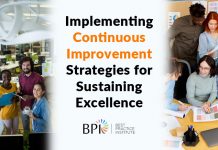Brian Fishel is a pragmatic, no-nonsense Human Resources Leader who focuses on practices that achieve results in line with the business’ strategy. As the CHRO of Keybank, he has created 12 principles for HR leadership that make working for him and KeyBank clear, understandable, and a part of the everyday working dialogue and decision making.
As Brian told me, “If there is a question about decision-making, employees simply go to the principles and the answer is there.” He continued, “The principles are a way to engage in active dialogue with employees about their work so that decisions and success is transparent and achievable.”
The structure of business today must be guided by more than guidelines and procedures, handbooks and job descriptions; and trickle-down, government-mandated employment laws. An operating philosophy or a set of guiding principles based on foundational values provides a better compass than the EEOC, ADA, FLSA, or OSHA ever could. Though all good agencies providing necessary services, they were created to protect employees from misaligned business practices. That’s the reason a sound business philosophy is the cornerstone of a successful business and provides direction when there is confusion, clarification when there is misunderstanding, transparency where there is doubt and support when others are struggling.
This philosophy has proven successful in producing high-performing relationships by facilitating open and transparent communication between team members. Here are 12 fundamentals of Brian’s philosophy to attain the cohesiveness needed to experience excellence in everything.
-
Learn the Business
The first fundamental is to keep in mind that in Human Resources, our jobs start and end with the business. In order to “be at the table,” one must understand the business, its drivers, and priorities and be able to communicate in those terms—not “HR-ease.” Too often, we want to adopt the language found in HR magazines and what we pick up at conferences, but they are mainly used between colleagues in the HR world. When at work, speak the language of our business and our peers.
-
Join the Team
We must remember that WORK is a team sport. One must not compete with their peers. Zig Ziglar once said that you can get anything you want out of life if you just help enough people get what they want. The definition of success includes helping peers and colleagues succeed and get ahead.
-
Leader vs. Authoritarian
Leadership is not a title, it’s creating authentic “followership” and being a go-to person for others. Through listening, having empathy, showing respect, and keeping a “we” attitude as opposed to “us against them,” you will generate innovated, engaged, and creative followers rather than employees awaiting instructions. As John Maxwell once said, “True leadership must be for the benefit of the followers, not to enrich the leader.” [1] And Robert Greenleaf stated, “The servant-leader is servant first, it begins with a natural feeling that one wants to serve, to serve first, as opposed to, wanting power, influence, fame, or wealth.” [2]
-
Listening is Communicating
Soliciting and providing feedback is expected. Source and listen to diverse points of view, even when they contradict your own assumptions. While gathering feedback is important, one is not compelled to use all of it but, if not, then one owes the person an explanation as to why.
-
Do What is Right, Not to Please
You can please some of the people all the time, and all the people some of the time, but hardly ever can you please all the people all the time. Don’t become obsessed with trying to do so.
-
Confidentiality is Beyond Critical
It’s mandated that all news, information, gossip, and hearsay, stay close to the chest. We are professionals and keep business and personal information under rap. Our news is not for publication or public consumption. Without confidentiality, you cannot be a trusted advisor to the business.
-
Use the Decision Tree for Clarification
I believe in a straightforward model for achieving efficient and effective decision making. This decision tree serves as a transparent tool that will bring clarity to most issues:
-
My decision without other’s input
-
My decision with others’ input
-
Someone else’s decision with my input
-
Someone else’s decision without my input
-
Differentiated Performance Wins
Differentiated performance gets rewarded because this system produces the highest quality of performance for the business. It keeps everyone aligned toward the same overall goals and mission of the organization.
-
Conflict Resolution
If you come to complain about someone, be prepared to bring them with you. Most conflicts can be resolved at the onset. It’s when people allow petty issues to fester that conflict interferes with work, impacting the business. What we all learned in the kindergarten of doing what is right and treating others with respect still works as adults.
-
Change is Good
When confronted with change, “run through the fire.” It’s been said that no one likes change except a baby with a wet diaper. Learn to seek change, embrace change, and accept change. Stagnation kills a business. Learn to adopt and adapt to good disruptions.
-
Love Your Work
Like what you do and with whom you do it. Being engaged at work means that the work is satisfying, stimulating, exciting, and a little fun. If you don’t love the work, or those you work with, find a job that better suits you.
-
Know the Order of Things
One final guiding principle to adopt that will keep all of the other principles in perspective and alive,
Always keep:
-
The Company First
-
The Team Second
-
The Individual Third
This selfless focus will ensure that any and all of the above principles will be adopted when needed.
Company Philosophy
A business that only follows generic business practices will never grow, but a combination of a foundational business philosophy, along with structured business fundamentals will excel. The above principles have proven successful for Brian, his team, and employees at KeyBank. Referring to these principles have helped people communicate more clearly, build greater business relationships, and can be used as a resource when they are confused, unclear, or need a logic behind their decision-making process.
[1] John C. Maxwell, Developing the Leader Within You 2.0, Thomas Nelson, 2018
[2] Robert K. Greenleaf, Servant Leadership: A Journey into the Nature of Legitimate Power and Greatness, Paulist Press; 25 Anv edition (November 1, 2002)










